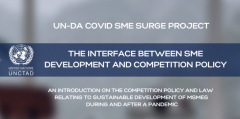
MSMES are becoming increasingly important because of the Agenda 2030 for Sustainable Development. The adoption of the Agenda 2030 for Sustainable Development in 2015 represented a renewed commitment in world partnership for tackling persistent challenges faced by developing countries in meeting the goals. The pertinent goals in the context of this course include those related to alleviation of poverty, zero hunger, gender equality, decent work and economic growth, reduced inequalities, responsible consumption, and products. Nevertheless, the global prevalence of the corona virus disease [COVID-19] and its various mutations since 2019 have affected the attainment of these goals. Of particular concern, the impact has been adverse on the MSMEs, leading to market exit. Regional dialogue meetings held by UNCTAD on the subject matter have established a similar pattern of adverse effects. Various interventions have been made in the marketplace during the COVID-19 pandemic by governments, MSME agencies and Competition Authorities, which have included actions against price gouging, non-intervention in non-egregious cooperative arrangements and government funding. Competition policy has long been linked to objectives such as economic efficiency that facilitate key components of the Agenda 2030 for Sustainable Development. Hence, this course aimed at bringing to the fore the application of competition policy and law interventions that further the entry, growth, and sustainable development of MSMEs, more so during and after a pandemic such as COVID-19.
Access the course here
